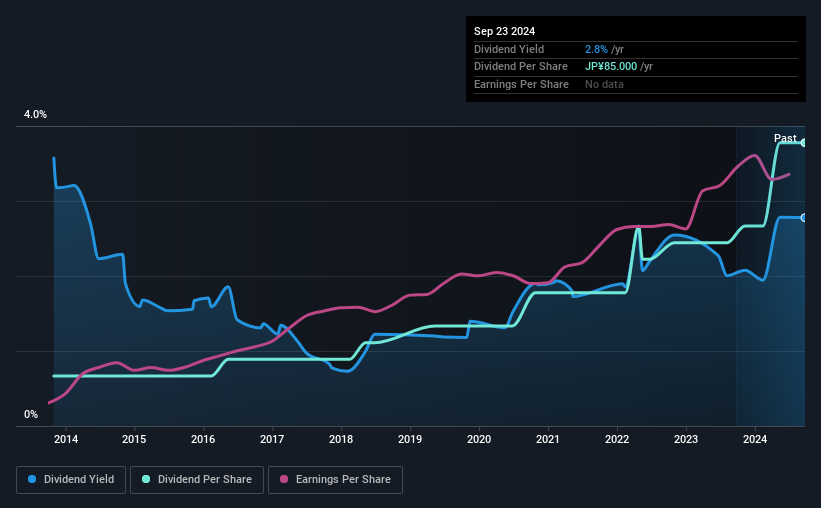Is It Smart To Buy NSW Inc. (TSE:9739) Before It Goes Ex-Dividend?

It looks like NSW Inc. (TSE:9739) is about to go ex-dividend in the next three days. The ex-dividend date occurs one day before the record date which is the day on which shareholders need to be on the company's books in order to receive a dividend. The ex-dividend date is important as the process of settlement involves two full business days. So if you miss that date, you would not show up on the company's books on the record date. In other words, investors can purchase NSW's shares before the 27th of September in order to be eligible for the dividend, which will be paid on the 4th of December.
The company's next dividend payment will be JP¥40.00 per share. Last year, in total, the company distributed JP¥85.00 to shareholders. Based on the last year's worth of payments, NSW has a trailing yield of 2.8% on the current stock price of JP¥3060.00. Dividends are a major contributor to investment returns for long term holders, but only if the dividend continues to be paid. We need to see whether the dividend is covered by earnings and if it's growing.
See our latest analysis for NSW
If a company pays out more in dividends than it earned, then the dividend might become unsustainable - hardly an ideal situation. NSW paid out a comfortable 29% of its profit last year. Yet cash flow is typically more important than profit for assessing dividend sustainability, so we should always check if the company generated enough cash to afford its dividend. Fortunately, it paid out only 36% of its free cash flow in the past year.
It's positive to see that NSW's dividend is covered by both profits and cash flow, since this is generally a sign that the dividend is sustainable, and a lower payout ratio usually suggests a greater margin of safety before the dividend gets cut.
Click here to see how much of its profit NSW paid out over the last 12 months.

Have Earnings And Dividends Been Growing?
Businesses with strong growth prospects usually make the best dividend payers, because it's easier to grow dividends when earnings per share are improving. Investors love dividends, so if earnings fall and the dividend is reduced, expect a stock to be sold off heavily at the same time. Fortunately for readers, NSW's earnings per share have been growing at 14% a year for the past five years. Earnings per share are growing rapidly and the company is keeping more than half of its earnings within the business; an attractive combination which could suggest the company is focused on reinvesting to grow earnings further. Fast-growing businesses that are reinvesting heavily are enticing from a dividend perspective, especially since they can often increase the payout ratio later.
Many investors will assess a company's dividend performance by evaluating how much the dividend payments have changed over time. NSW has delivered an average of 19% per year annual increase in its dividend, based on the past 10 years of dividend payments. Both per-share earnings and dividends have both been growing rapidly in recent times, which is great to see.
Final Takeaway
Is NSW an attractive dividend stock, or better left on the shelf? NSW has been growing earnings at a rapid rate, and has a conservatively low payout ratio, implying that it is reinvesting heavily in its business; a sterling combination. NSW looks solid on this analysis overall, and we'd definitely consider investigating it more closely.
Keen to explore more data on NSW's financial performance? Check out our visualisation of its historical revenue and earnings growth.
Generally, we wouldn't recommend just buying the first dividend stock you see. Here's a curated list of interesting stocks that are strong dividend payers.
Valuation is complex, but we're here to simplify it.
Discover if NSW might be undervalued or overvalued with our detailed analysis, featuring fair value estimates, potential risks, dividends, insider trades, and its financial condition.
Access Free AnalysisHave feedback on this article? Concerned about the content? Get in touch with us directly. Alternatively, email editorial-team (at) simplywallst.com.
This article by Simply Wall St is general in nature. We provide commentary based on historical data and analyst forecasts only using an unbiased methodology and our articles are not intended to be financial advice. It does not constitute a recommendation to buy or sell any stock, and does not take account of your objectives, or your financial situation. We aim to bring you long-term focused analysis driven by fundamental data. Note that our analysis may not factor in the latest price-sensitive company announcements or qualitative material. Simply Wall St has no position in any stocks mentioned.
About TSE:9739
NSW
Provides enterprise, services, embedded, and device solutions in Japan.
Flawless balance sheet established dividend payer.


